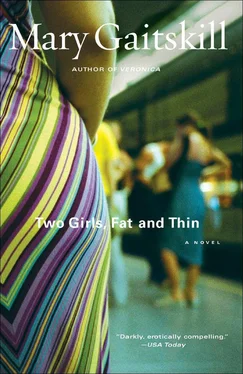Mary Gaitskill - Two Girls, Fat and Thin
Здесь есть возможность читать онлайн «Mary Gaitskill - Two Girls, Fat and Thin» весь текст электронной книги совершенно бесплатно (целиком полную версию без сокращений). В некоторых случаях можно слушать аудио, скачать через торрент в формате fb2 и присутствует краткое содержание. Год выпуска: 2012, Издательство: Simon & Schuster, Жанр: Современная проза, на английском языке. Описание произведения, (предисловие) а так же отзывы посетителей доступны на портале библиотеки ЛибКат.
- Название:Two Girls, Fat and Thin
- Автор:
- Издательство:Simon & Schuster
- Жанр:
- Год:2012
- ISBN:нет данных
- Рейтинг книги:5 / 5. Голосов: 1
-
Избранное:Добавить в избранное
- Отзывы:
-
Ваша оценка:
- 100
- 1
- 2
- 3
- 4
- 5
Two Girls, Fat and Thin: краткое содержание, описание и аннотация
Предлагаем к чтению аннотацию, описание, краткое содержание или предисловие (зависит от того, что написал сам автор книги «Two Girls, Fat and Thin»). Если вы не нашли необходимую информацию о книге — напишите в комментариях, мы постараемся отыскать её.
Review) create a haunting and unforgettable journey into the dark side of contemporary life and the deepest recesses of the soul.
Two Girls, Fat and Thin — читать онлайн бесплатно полную книгу (весь текст) целиком
Ниже представлен текст книги, разбитый по страницам. Система сохранения места последней прочитанной страницы, позволяет с удобством читать онлайн бесплатно книгу «Two Girls, Fat and Thin», без необходимости каждый раз заново искать на чём Вы остановились. Поставьте закладку, и сможете в любой момент перейти на страницу, на которой закончили чтение.
Интервал:
Закладка:
I sat in study hall . The room was full of voices moving through the air like colored balloons. Urine trickled down the legs of my chair and made a puddle on the floor. No one seemed to notice. I delicately lifted one red and black shoe, shook it, and removed it from the puddle. It was a strange sensation to be doing such a private thing in public, even if I hadn’t done it on purpose. I tried to tighten my collapsing bladder, but warm pee continued to trickle between my legs, into my pantyhose, and down my chair as the giggly words from the next table floated by.
My mother began taking me to see a psychiatrist named Dr. Eldridge Mars. I liked him. He was a tall, thin man with dandruff and madly optimistic eyes burning behind a pair of dust-covered glasses that sat, with affable kookiness, in the middle of his nose. When I went to visit him, my mother waited for me in the lobby along with other mothers and two plastic toys with grinning faces on wheels. The front wheels turned at radical angles from the yellow and chartreuse bodies, as though grinning horse and grinning dog had violently swerved to avoid a collision. Dr. Mars took me down a hall to a candy machine and bought me a chocolate bar. Then we went to his office and he asked me questions. Did I have any friends? Did I like school? What did I want to be when I grew up? Then he produced a dog-eared manila folder of pictures and asked me to imagine what was happening in each picture as he showed it to me. He showed me a cheap reproduction of an early Flemish family portrait: the exhausted mother and father in the dull gray background, the young daughter in a high-necked dress in the foreground. “The daughter has just been raped,” I explained. “And she’s wondering how to tell her parents.”
I began reading The Bulwark during the winter of my seventeenth year. It was not exactly true that it became “the most important influence in my life” from the tenth page on as I would later tell Justine Shade, but I was deeply moved by the description of Asia Maconda and Frank Golanka, the proud outcasts moving through a crowd of resentful mediocrities, surrounded by the cold glow of their genius and grace. I was profoundly satisfied by the terse, brutal prose, blunt as a bludgeon. Granite drew ugliness and beauty with the same unveiling hand; there was no attempt at bravado, yet the elegant gesture with which she plucked off the obscuring extranea was exquisite. When I read the words of Anna Granite, I visualized a man with a splendid chest standing stripped to the waist in a moonlit snow-covered field. He stood erect, arms loose at his sides, fists lightly balled, waiting in the dark for something he alone understood.
“When I look at this stone, Miss Maconda, I see not only an object made up of mineral and material parts, but properties of color, curves and density that exist in their own point in space. This rock exists, Miss Maconda, because it exists. Not because I want it to exist, or because I imagine it exists, or because anyone else imagines it exists but because it does. And just as this rock and its properties exist, so do it and its properties exist on an abstract level. They are projected into being, Miss Maconda, by this mundane physical shape. It is those abstract properties that I represent in my work. As accurately and truthfully as I can.”
Asia listened, her perfect head tilted coolly to one side, her long jade eyes half-closed in their usual mocking expression. Her fragile form stood at such an angle that she appeared to be supported by air. Only her dilated pupils betrayed the surge of emotion she felt at his words. She looked at the canvas before her — at the arrogant strength of the line, the elegant hauteur of the spare details, the distinct bold use of color. There was not one element in it that shrunk from the fullest statement of what it was. It was a gauntlet flung in the face of everything cheap, trivial and false. The thought of it in a gallery full of conceptual, cubist and surreal trash made her want to die.
It was the same brave evocation of beauty that I had loved in Orwell — except that this was strong, contemptuous beauty, a beauty indifferent to anything but itself and its own growth. In Orwell’s world, beauty was unreachable, and the attempt to grasp it was fatal; the frail shadow you could hold in your hand was quite possibly not worth the attempt, however admirable that attempt might be. In Granite’s world, it thrived, proud and undeniable. It could be had by the strong and at least admired by the weak. As I read, the actions and words of Granite’s characters settled like a mantle over the people around me. Jana Morgan, Emma Contrell and the D’Arcy twins became spritelike partial elements of Asia Maconda: Jana the languid beauty Asia, sitting with her waist twisted so that her breasts were accented, not because she cared about making people desire her, but because she knew that Beauty is part of what makes life livable. Emma, the abandoned, passionate Asia, so deeply sensitive to the viciousness and dishonesty in the world that she would disfigure her own integrity and insult her body with subhuman lovers rather than let her natural purity exist side by side with corruption. The D’Arcy twins, one jumping into the air in a jackknife to slam a volleyball with two fists while the other bounded across the floor to help it over the net, were the vicious snakelike Asia who teases men and humiliates women.
And I myself was another aspect of Asia, as I sat silently at the dinner table while my father crouched above his plate, reviling me. I felt, in addition to the inevitable dislocated shame, a strange kind of pride; I was almost grateful to my father for hating me. I was accepting the discharge of an aggression that was an essential part of the life force.
The greater pain she was subjected to — every mediocre piece of trash she was asked to review, every fatuous ass she saw praised as a great artist, every empty conversation at every party, every night alone — only created a thicker wall between her and the rest of the world, a wall that protected her from being poisoned by its mediocrity. It was behind this wall that she really lived, in a small world of dazzling white. In this world, she was never cruel or cold, but gentle and wondering as a child in a garden. She was alone and lonely, and it was this cherished loneliness that gave her inner world its inviolate whiteness.
If I could see aspects of Asia all about me, even in myself, I could see Frank Golanka nowhere in my world. This did not make him less real than Asia Maconda — on the contrary. The absence of his reflection in my daily life rendered him exalted, immune to my vulgar fantasies, more inviolate than Asia behind her wall. His absence cast a silent spell over my world, he was all life’s potential suspended in a state of constant possibility, the prince who could awaken me with a kiss. At any moment he could appear, but if he didn’t I could spend the rest of my life caressing the possibility. Like Katya in The Last Woman Alive , I nurtured myself with dreams of what could be. On those nights when my father came to me, these dreams were the mainstay on which my listing comprehension attached itself, the immobile constant that stood watch while I struggled to maintain silence and stillness.
I didn’t speak to Donna of my feelings about Anna Granite. I lent her The Bulwark , but she was unable to finish it; she returned it with an indifferent mumble about big words.
I spoke to Dr. Mars about it only once. “I want life to be like it is in Anna Granite’s books,” I said. “I want life to matter.”
“Well, that’s very normal,” said Dr. Mars. “We all want life to matter. And sometimes it seems like it just doesn’t.”
“I want people to be like Anna Granite’s people. Perfect and strong.”
Читать дальшеИнтервал:
Закладка:
Похожие книги на «Two Girls, Fat and Thin»
Представляем Вашему вниманию похожие книги на «Two Girls, Fat and Thin» списком для выбора. Мы отобрали схожую по названию и смыслу литературу в надежде предоставить читателям больше вариантов отыскать новые, интересные, ещё непрочитанные произведения.
Обсуждение, отзывы о книге «Two Girls, Fat and Thin» и просто собственные мнения читателей. Оставьте ваши комментарии, напишите, что Вы думаете о произведении, его смысле или главных героях. Укажите что конкретно понравилось, а что нет, и почему Вы так считаете.












